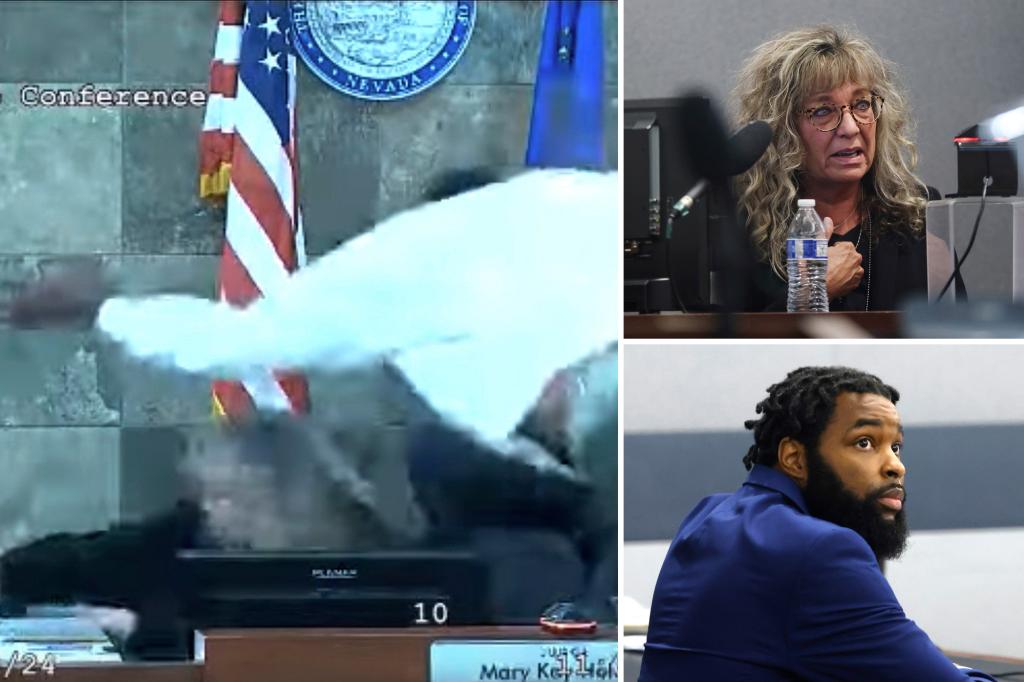The courtroom drama unfolded in Las Vegas, where Deobra Redden, a 31-year-old convict with a history of violence and mental health struggles, faced sentencing for a shocking attack on District Judge Mary Kay Holthus. The incident, captured in a viral video, depicted Redden launching himself over the judge’s bench in a “Superman-style” assault, tackling her to the ground as court personnel frantically intervened. The attack, which occurred in January, stemmed from a separate criminal case in which Holthus was about to pronounce Redden’s sentence. The brazen assault led to attempted murder charges, to which Redden pleaded guilty in September.
The sentencing hearing became a stage for conflicting narratives. Redden, while acknowledging his actions, vehemently denied any intent to kill Judge Holthus. Attributing his behavior to his schizophrenia, he claimed to care about the judge’s well-being, insisting he wasn’t a “bad person” or an “evil guy.” His fragmented recollection of the event centered on jumping on the judge and grabbing her robe, questioning her actions towards him. Redden’s lawyer, Carl Arnold, advocated for a lighter sentence of 4 to 11 years, emphasizing Redden’s compliance and remorse since resuming his medication. He argued against a harsh sentence, believing it would benefit no one, while acknowledging the need for consequences.
In stark contrast, Judge Holthus, in a victim impact statement read by prosecutors, described Redden as having made a “conscious decision to kill me and make every effort to succeed.” Her statement painted a picture of a calculated and deliberate attack, leaving no room for doubt about Redden’s intentions. The judge’s words underscored the gravity of the assault, not just as an attack on an individual but as an assault on the very foundation of the justice system. This sentiment was echoed by Judge Susan Johnson, who presided over the sentencing, characterizing Redden’s actions as an “attack on the judiciary.”
Judge Johnson ultimately handed down a substantial sentence of 26 to 65 years, reflecting the seriousness of the crime and its potential impact on public trust in the judicial process. Redden’s extensive criminal record, which included violent offenses, likely played a role in the severity of the punishment. The sentence brought a sense of closure to the ordeal, while also highlighting the complexities of dealing with individuals struggling with mental illness within the criminal justice system.
The case of Deobra Redden raises critical questions about the intersection of mental health and criminal responsibility. While his schizophrenia undoubtedly played a role in his actions, the court’s decision underscores the need to balance compassion with the imperative to protect the integrity of the judicial system and ensure the safety of those who uphold the law.
The incident serves as a stark reminder of the potential dangers faced by judges and court personnel, who often deal with individuals facing difficult circumstances and emotional distress. The attack on Judge Holthus highlights the need for enhanced security measures in courtrooms to protect those tasked with administering justice, while simultaneously addressing the underlying issues that contribute to such violent outbursts, including mental health concerns and access to appropriate treatment. The case also prompts reflection on the broader societal challenges of providing adequate mental health resources and ensuring that individuals like Redden receive the care they need to prevent such tragic incidents from occurring in the future.










